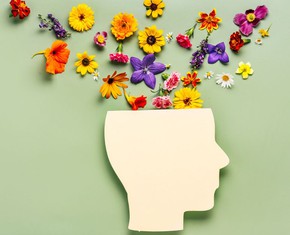The views expressed in our content reflect individual perspectives and do not represent the authoritative views of the Baha'i Faith.
Love, as the poets and the prophets tell us, can never be coerced. We all know that some degree of free will is involved in an authentic love relationship when it occurs between two cognitive beings.
RELATED: Is Romantic Love an Illusion?
For though we may not be able to choose whether or not we are attracted to someone, we can determine how we respond to that attraction. For unlike unilateral affection, such as our “love” of pistachio nuts, marzipan, or baklava, human love requires mutuality of attraction followed by a willful response.
Falling in Love — Organically
One of the more important attributes of love we need to comprehend if we are to unveil this huri/mystery is that love is an organic process, not an event. The Baha’i teachings, especially in this talk Abdu’l-Baha gave in Paris — the city of love — remind us that temporary, event-based love is only “the yielding of the hearts to the accidents of life:”
But the love which sometimes exists between friends is not (true) love, because it is subject to transmutation; this is merely fascination. As the breeze blows, the slender trees yield. If the wind is in the East the tree leans to the West, and if the wind turns to the West the tree leans to the East. This kind of love is originated by the accidental conditions of life. This is not love, it is merely acquaintanceship; it is subject to change.
Today you will see two souls apparently in close friendship; tomorrow all this may be changed. Yesterday they were ready to die for one another, today they shun one another’s society! This is not love; it is the yielding of the hearts to the accidents of life. When that which has caused this “love” to exist passes, the love passes also; this is not in reality love.
Our contemporary perspective about love most often perceives love as a moment of orgasmic delight rather than as a sophisticated, ongoing organic process. According to some scholars, we inherited this misapprehension from romantic notions about love that evolved during the medieval era in the courtly literature of Provençal France.
The concept of love as an event, as an impulse that strikes us down beyond our willful control, is not entirely ridiculous. The fact is that the initial stages of attraction or infatuation do occur — we don’t make this stuff up. We become smitten, besotted, overwhelmed, whether we want to or not. That’s why the idiom of “falling” seems appropriate; we fall in love, even as we might trip over a precipice, and that’s that.
We could at this point meander into a rather lengthy discourse on the origins of this attitude about love, and how its pernicious influence on us individually and as a society has distracted us from achieving our full potential as human beings. But as I have already done much of that in this previous series of BahaiTeachings.org articles, I think it sufficient here to note two major outcomes this assumption about the nature of love inflicts on us.
Falling in Love Powerlessly
The first unfortunate outcome is that we have come to believe that once we “fall” in love, we are powerless to resist its hold on us. After all, we did not pursue this attraction. We did not seek it out. Love just happened to us! How, then, can we be held accountable or responsible for whatever course of action we take as a result? Being enthralled in the throes of love and love-longing was referred to in medieval romances and lyric poetry as “the malady of love.” Military imagery was also often employed in poetry and romance literature to describe being “conquered” by the victorious beloved. Love, in such a context, becomes a battle, and the opposing forces are the lover and the beloved.
When society as a whole concurs with or tacitly sanctions this rather naive and juvenile understanding of love, then all sorts of actions that would otherwise be perceived as sinful or at the very least inappropriate or unwise are then considered acceptable and, in some cases, admirable and courageous. The husband or wife be damned! The children too! Even the dog or cat! It could not be helped! Someone “fell” in love, so more power to them! Divide up the family, the children, the furniture, the dog and the cat, even as the wise Solomon proposed!
RELATED: A Modern Affliction: The Neurotic Concept of Love
Falling Out of Love
The second unfortunate outcome of this “take” on love as an accident, as an event beyond human control, is that if we can “fall” in love, we can just as unpredictably and unintentionally “fall out” of love. It matters not how much love he or she once had for the spouse or the children or the dogs and cats – when love fades, it’s really nobody’s fault, right? It could not be helped! One person “fell out of love” with the other, and it is clearly inappropriate and “unnatural” to stay in a “loveless” relationship.
In short, the lack of love is likewise considered a matter of fate, even if it results merely from weariness with the sameness of a relationship, regardless of how long it may have endured or how many others are made to suffer as collateral damage from its destruction. After all, the relationship simply lost its zing, its zest, like a car when the smell of newness wears off, or worse, the transmission goes.
Naturally, when love is gone, there is no reason to consider the vows, the promises, the covenants and conventions of social, civil, or religious authority as binding, is there? How can anyone be held accountable for forces beyond their control?
Instead, the Baha’i teachings say, true love between human beings requires committing to a long-term process of inner growth and development with a partner, what Abdu’l-Baha referred to in his writings as a dual physical and spiritual unity:
… husband and wife should be united both physically and spiritually, that they may ever improve the spiritual life of each other, and may enjoy everlasting unity throughout all the worlds of God.
















Comments
Sign in or create an account
Continue with Googleor